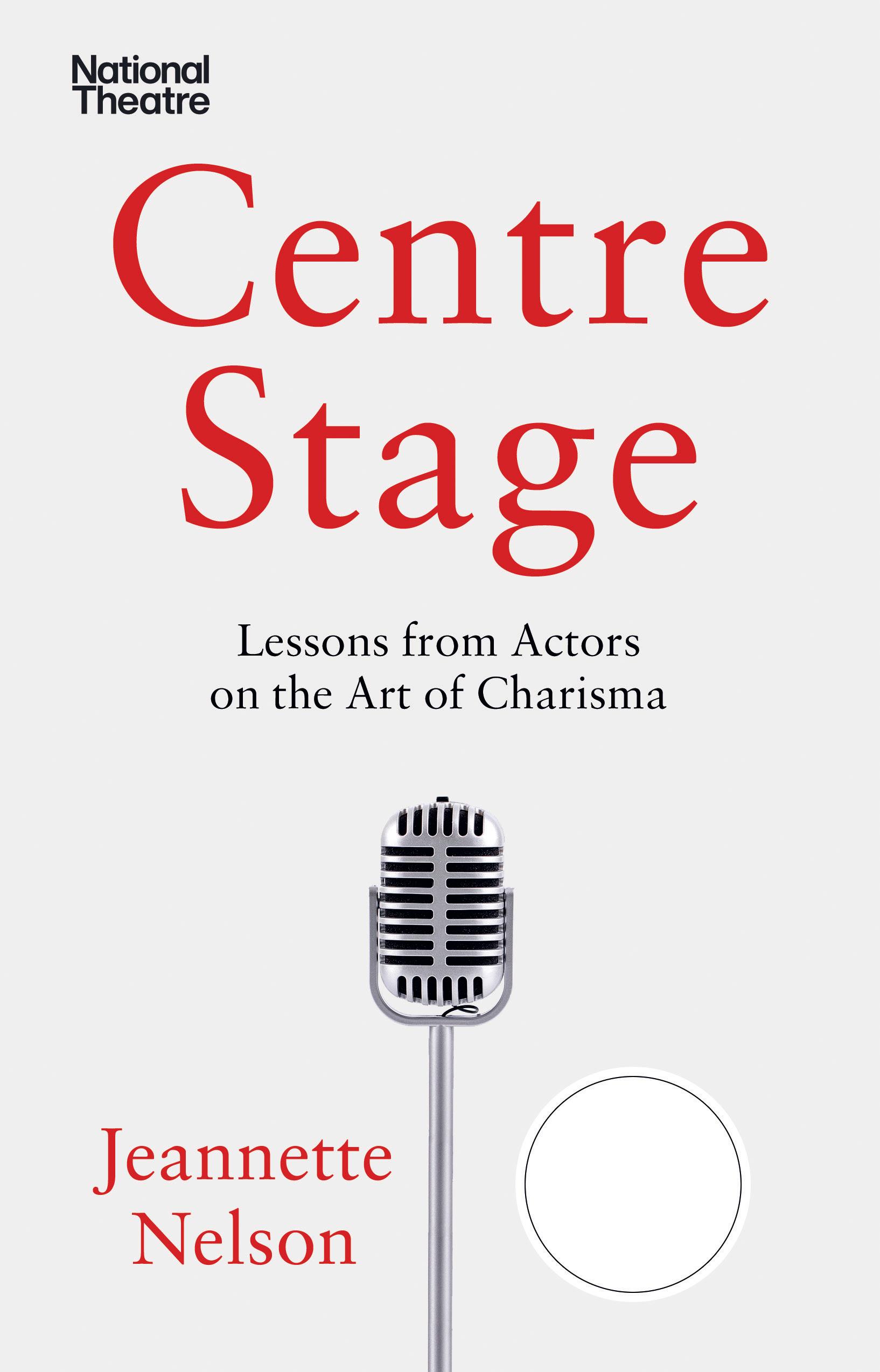Lessons from Actors on the Art of Charisma
Cornerstone Press 20 Vauxhall Bridge Road
London SW 1V 2SA
Cornerstone Press is part of the Penguin Random House group of companies whose addresses can be found at global.penguinrandomhouse.com.
Copyright © Jeannette Nelson, 2024
The National Theatre’s logo is used with the permission of The Royal National Theatre. All rights reserved
Jeannette Nelson has asserted her right to be identified as the author of this Work in accordance with the Copyright, Designs and Patents Act 1988.
First published by Cornerstone Press in 2024 www.penguin.co.uk
A CIP catalogue record for this book is available from the British Library.
ISBN 9781847943354
Typeset in 12/17pt Dante MT Std by Jouve (UK), Milton Keynes Printed and bound in Great Britain by Clays Ltd, Elcograf S.p.A.
The authorised representative in the EEA is Penguin Random House Ireland, Morrison Chambers, 32 Nassau Street, Dublin D 02 YH 68
Penguin Random House is committed to a sustainable future for our business, our readers and our planet. This book is made from Forest Stewardship Council® certified paper.
To the many, many actors and directors from whom I have learned my trade and especially to the wonderful actors who contributed to this book.
Part III:
INTRODUCTION
I will never forget the first time I saw Al Pacino rehearse a scene. It was 2004, and I was voice coach on the film of The Merchant of Venice directed by Michael Radford, with Al playing the role of Shylock. From the moment he arrived in the rehearsal studio, he was in character. He wore black clothes, including a long, black coat, and carried his body in a downward leaning posture, his eyes mainly looking to the floor. But when he lifted them, he had the most penetrating gaze. Even in that first rehearsal he was astonishingly powerful, and the young actors in the scene with him appeared almost paralysed by that power. I soon learned just how committed Al is to his work. When it came to filming, his intense energy, focus, creativity and stamina paid tribute to his training and his early career in theatre. He would ask for take after take of each of his scenes until he was satisfied that he had offered up
everything he could, resulting in a very human, complex and compelling portrayal of his character. This fascinating presence was not something that only emerged on screen, however; he had the same quality in real life. One evening after rehearsals, he invited us to drinks at his apartment in New York. In that relaxed setting, at home with fellow professionals and friends, he was a charming host and as charismatic as he is on camera. Like many of the actors I have met, his personality wasn’t forceful or dominating; it emerged from an understated self-confidence and selfreliance that made him very attractive. When I spoke to him, his attention seemed to be entirely on me. He was really listening to what I said.
When you encounter very charismatic people like Al, it is tempting to assume that it is something that has come to them naturally, that some of us are simply better at holding people’s attention than others. There might be some truth in that idea. But observing Al Pacino and other great actors makes you realise that their charisma – in performance and in person – often comes from their commitment to their work: the craft and art of acting. And it is a craft we can all learn from.
This book is going to introduce you to some of the work I do with actors to help them communicate powerfully and charismatically. As a voice coach, my job is to help actors fulfil and maintain their potential as artists who are, above all, communicators. I will share with you some
Introduction
of the advice I give to them and the exercises I use to get the best out of their voices, their bodies and their scripts. Along the way, I will share some of their experiences with you – experiences that they were kind enough to share with me in my research for this book. By introducing you to the methods that actors use to communicate effectively, my hope is that you too will glean insights into how to perform with charisma in your own life.
ACTORS AS ARTISTS
Working with actors is a privilege. Being part of the creative process of artists has led me to work on some of the most demanding stages in the world, everywhere from the National Theatre, the Royal Shakespeare Company, Shakespeare’s Globe Theatre, Sydney Theatre Company and in most of London’s beautiful, iconic West End theatres, to school halls, warehouses, churches and even the Houses of Parliament. In many cases, I have been lucky enough to work with an actor from the very beginning of their artistic journey at drama school right through to the height of their profession.
During this time, I have had the pleasure of working with some of our most talented actors and, as any teacher will tell you, working with people of great talent and ability always teaches the teacher as much as the student. I
Centre Stage
first understood how an actor can fill the National Theatre’s Olivier stage by watching and listening to actors who have performed there for years. I have learned how to help actors with their vocal projection and clarity by working alongside those who began their careers in regional repertory theatres in the 1950s. I have seen how an actor can take an audience on a journey with clever, subtle shifts in their body language that draw the audience’s attention to where they want it to go. Every day I see actors being so free and flexible with their bodies, voices and minds that you forget who they are; you only see and hear the character and the story being told.
In a career spanning over thirty years – twenty-five of those at the National Theatre – my role has been to support actors from the first day of rehearsal to the day the play closes. During the five or six weeks of rehearsal, I work with them individually and in groups. My job in the early stages is to check in with how comfortable they are with their vocal technique and the vocal demands of the play. We may do a voice ‘workout’, using some of the exercises I will be sharing with you in this book, which will ensure they are heard clearly throughout the theatre. When I’m not working with the actors directly, I attend rehearsals to hear how their voice work is progressing and, equally importantly, I listen to what the director is asking them to do. Once the play begins preview performances – when we have evening audiences but are still rehearsing
Introduction
during the day – I lead pre-show voice warm-ups, and I attend performances to monitor the actors’ audibility and clarity. After the Press Night, when the play has officially opened, I continue to lead regular warm-ups and keep my ear on the work by attending performances from time to time.
I also work with actors on the language of the script, especially if it is a classical or political play. An important part of my career has been to study the work of great playwrights, from the timeless classical plays of ancient Greece and Rome, through medieval mystery plays, Shakespeare and his contemporaries and the plays of the Restoration period, to the groundbreaking plays of Chekhov and Ibsen and right up to the present. From these great writers I have learned how stories in drama are told and how believable, truthful characters are formed. I have learned how language can be used, structured and spoken in ways that change people, situations and stories. From this study and my knowledge of the body and voice, I am able to work alongside actors and directors to support and develop the art they are making.
My job is twofold. First, I keep the actors’ voices in shape and up to the task of performing night after night in theatres big and small. Second, I help them to recognise and understand the way the play is written, and to empower them to use the language in active and persuasive ways.
Centre Stage
This book will offer you insights from both sides of my job: from the exercises I use to help actors warm up their voices before they go on stage and insights into how to feel in control in any room or on any stage, to the methods I use to help actors understand the most difficult scripts they are working with. In offering you these methods, my hope is that you will feel more confident ‘performing’ in your own life. This book will be particularly useful for anyone who is preparing to speak in front of a large group – perhaps you are getting ready to give a wedding speech, or have been working up to a crucial presentation in your job. Or maybe you need to deliver an important talk at a conference. In every case, this book will introduce you to exercises that will allow you to communicate clearly, confidently and – above all – charismatically. However, the insights I can impart are not limited to big, set-piece speeches. You can also learn how to ‘hold the room’ in a conversation by the water cooler, at a dinner party, or in the pub. You can learn to feel more confident and comfortable socially by becoming aware of how your body and voice work, by listening to others more effectively and by becoming aware of the give-andtake of conversation, debate and argument. You can learn to use your voice more expressively as you read a bedtime story to your children or grandchildren, or share your views with your book club or study group. Charismatic communication is useful in every setting.
WHAT IS CHARISMA?
What is it that gives a person charisma? We recognise it when we see it; many actors exude it. It is that quality that draws us to somebody, that makes us want to listen to them and to be around them. It is a quality that can hold an audience, from the stage and in the boardroom; on the screen and in the office; at a party and at dinner. It is also a quality that can be learned. Having trained young actors and then worked with them in professional theatre, I have seen them metamorphose from awkward teenagers to lovely, genuine, charismatic people – not just when they perform but in real life too. Most, though not all, actors train in drama school when they are in their late teens and early twenties; while there, they explore who they are and learn to have confidence in that person: an actor cannot transform into someone else if they don’t know who they are in the first place. They also learn to present that person to the world. Actors have to constantly ‘sell’ themselves to get work. In most professions you might interview for a job every three to five years; actors audition for many jobs every year, and, if they are lucky, get two or three of them. Actors suffer performance anxiety as well as the blows of rejection, but they have to learn to manage these, to make sure they can perform at the peak of their ability. It is not easy to maintain charisma in the face of these
challenges – but they do so through their understanding of their craft.
In the course of a life spent working with and teaching actors, I have come to conclude that charisma is made up of three powerful and dynamic qualities, which lie at the heart of this book: First, authenticity. Learning to develop charisma does not mean you will be artificial. Authenticity is very important to me, to actors and to the work we do together. My job as a theatre voice coach is to help the actors to free their voices so that they can respond to the characters and situations they are creating from a place of truth. If they are not truthful, the audience will soon spot it and they will not engage with the play or film. In fact, if they are not truthful, the actor would not get the job in the first place.
The same is true for you. If you try too hard to be liked, to please, to sound interesting or clever, your inauthenticity will show. You will probably be presenting some physical tension or be thought to be pushy. Your voice will give you away, as it will be harder for you to speak fluently, or to pace your delivery appropriately. Similarly, and maybe surprisingly, self-consciousness, shyness and anxiety can present as lack of interest or lack of intellect, which will also make you less likely to be trusted. If you are not brave enough to enter the room or to speak up, no one will know whether you are authentic or not in the first place. Authenticity, then, is the focus of the first two chapters of the book. In Chapter 1,
Introduction
I explain the practicalities of using your body with ease, to help you to look and feel confident, and to enable you to breathe and speak freely, while in Chapter 2, I explain how your voice works, and show you how, by improving your breath, resonance, projection and clarity, you will come to communicate in a more authentic manner.
The second quality when it comes to charisma is authority. In this context, authority does not mean power in the competitive sense, but power in the sense of being trusted and believed. That comes from knowledge of your subject, of course, but it also comes from having the confidence and ability to speak about it fluently. There is technique involved in becoming this kind of authoritative communicator. Actors research the plays they perform in and the lives of the characters they play very thoroughly but their authority comes from the ability to communicate well and tell stories that we engage with and believe. Authority does not mean overconfidence or unearned respect. It comes from knowledge of yourself and your subject, and your ability to communicate clearly and effectively. That is why the next section of the book will focus on how taking control of the situation in which you are communicating can bolster your sense of authority. In Chapter 3, you will learn to develop control over the delivery of your material, and in turn to be expressive and engaging. And in Chapter 4, you will learn how to ‘own’ the room you are in, including when speaking on film or video.
Last, but by no means least, is eloquence. A beautiful word, even if some might feel it is a little old-fashioned. There’s nothing antiquated about eloquence, however; it is fluent or persuasive speaking – as such, I consider it to be vital to modern life and it is certainly necessary to the world of plays and acting. Think of a scene from a play or television drama you have seen. You might already be thinking of well-known plays, like those of Shakespeare –Romeo persuading Juliet to kiss him at the party where they first meet, for example:
Romeo: Have not saints lips, and holy palmers too?
Juliet: Ay, pilgrim, lips that they must use in prayer.
Romeo: O then, dear saint, let lips do what hands do: They pray: grant thou, lest faith turn to despair.
But you can also see eloquence in soap operas, where characters are constantly trying to persuade each other to support them, or fall in love with them, or help them to make money. We do the same in real life. Eloquence is the ability to affect people through persuasive language. It is used in politics, playwriting, storytelling, debate, argument, flirting, lovemaking and warmongering. It is one of the most powerful tools in the great communicator’s toolkit. As such, the final chapter of the book focuses on eloquence. It examines useful rhetorical techniques, some







